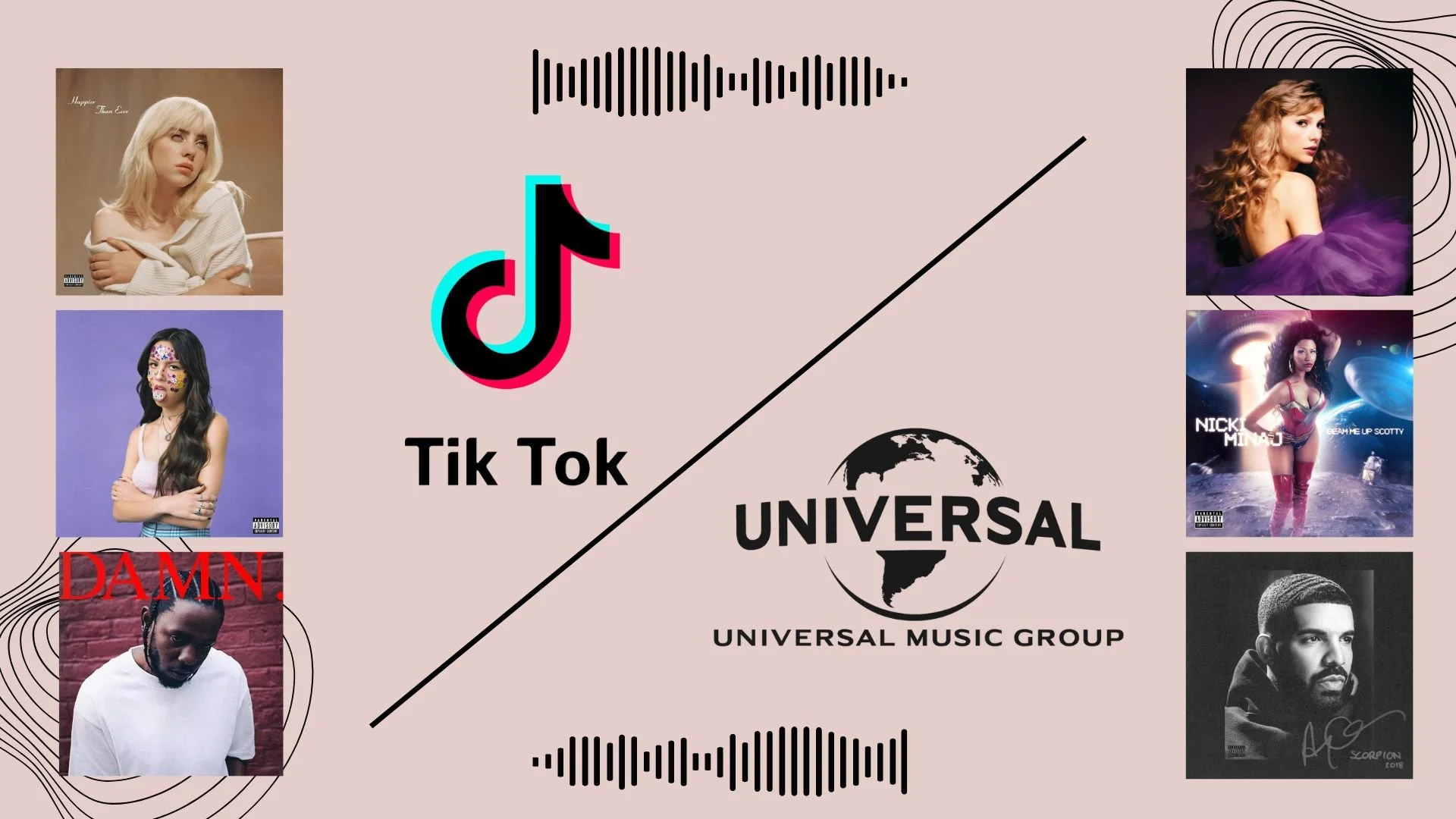TikTok hears sounds of silence after Universal Music Group pulls music from app
After UMG removed the music of all its artists from the TikTok app, users and content creators have noticed a massive change in their viewing experience. Photo collage by EMILY PARIS, Photo Editor
Tiktokers everywhere are begging Universal Music Group (UMG) to “Please don’t stop the music!” On Feb. 1, UMG pulled all of its music catalog from TikTok, resulting in millions of videos containing the music being muted.
Chapman University instructional assistant professor Travis Bartosh, who is also the faculty advisor for Chapman Radio, explained why this is such a difficult issue.
“Music law and music rights and music catalogs are just insanely complicated,” Bartosh said. “It seems like it’s always changing and always shifting… Like two years ago, there was a new music catalog that came out called the Global Music Rights catalog, and a lot of it had to do with payment. These artists were complaining that they weren’t getting paid enough so they joined this other music catalog.”
There have been back-and-forth talks between the two companies for years, starting with some of the major record labels asking UMG to share more of its income with their artists. So far, UMG has taken to the strategy of outright removal, meaning artists like Taylor Swift, Ariana Grande and The Weeknd are now off-limits to TikTok users. Whether Sony and Warner Music — the two other major music labels — will follow suit remains to be seen.
There have been conflicting statements about why UMG ultimately made the decision to remove their music, with the UMG open letter stating that TikTok was attempting to “...bully (UMG) into accepting a deal worth less than the previous deal…” and only accounts for about 1% of the label’s revenue. They also pointed out the issue of TikTok encouraging users to take part in AI music creation.
In their response, TikTok framed UMG’s actions as “self-serving” and as a result of “greed”. The argument was made that their app “...serves as a free promotional and discovery vehicle for (UMG’s) talent”.
Naturally, many TikTok users have noticed a negative impact on their viewing experience as an immediate result of the music removal. But the influencers and content creators have arguably been hit the hardest. Chapman student Cora Synnes, a lifestyle YouTuber and TikToker, spoke to The Panther about how her content has been affected.
“I think one of the best ways to get people to see your content is by using new songs that are trending,” said Synnes, a junior majoring in public relations and advertising. “Any time I go to make a TikTok, especially if I’m just looking for background music for a talking TikTok, I always see what’s trending. So I definitely threw a couple of songs that were UMG — such as (Ariana Grande’s) ‘yes, and?’ — in the back of some videos. I just recently went back on and looked, and they’re all muted now.”
Synnes got her start on YouTube about eight years ago and expanded her brand on TikTok in the last few years as it started taking over short-form content.
“In my experience, TikTok has just been a great platform to grow because it’s a lot easier for people to find your content. On YouTube, most likely someone has to have already been subscribed to you to find your videos. On TikTok, through the ‘For You Page,’ anyone can find you, so it’s such a great way for creators to expand their audience.”
Actor and lifestyle TikToker Jonathan Tysor, a Chapman screenwriting alumnus who graduated this past year, has also seen a slight change in terms of his own videos. However, the content creator noted that smaller artists are receiving the short end of the stick.
“It’s crazy because it’s not just these big artists that are with Universal Music Group because Universal Music Group has got these smaller labels. (UMG) is this giant corporation, so it’s not just affecting Taylor Swift; it’s also affecting these other artists that could really use TikTok as a platform to promote their own music. It really sucks for everyone involved. ”
The process of acquiring music for streaming is a difficult one. Bartosh gave The Panther a little insight into how that process works at Chapman Radio.
“The university buys the music catalogs so they have the rights to play songs at university events,” Bartosh told The Panther. “For us at Chapman Radio, we’re able to broadcast songs because the university bought the music rights to them from ASCAP and BMI.”
The American Society of Composers, Authors, and Publishers (ASCAP) and Broadcast Music, Inc. (BMI) are the two major players in the world of music rights. They advocate for artists to be compensated for their music catalogs. Any time Chapman students step foot into Argyros Forum, they’re hearing music from those two groups or the Global Music Rights catalog.
It remains to be seen whether UMG will keep their music off of TikTok or engage in negotiations about improved royalties. For now, content creators will have to pivot to utilize new music— the major trend right now being royalty free music— app users will continue with an altered experience, and smaller musicians will have to fight for increased compensation.

